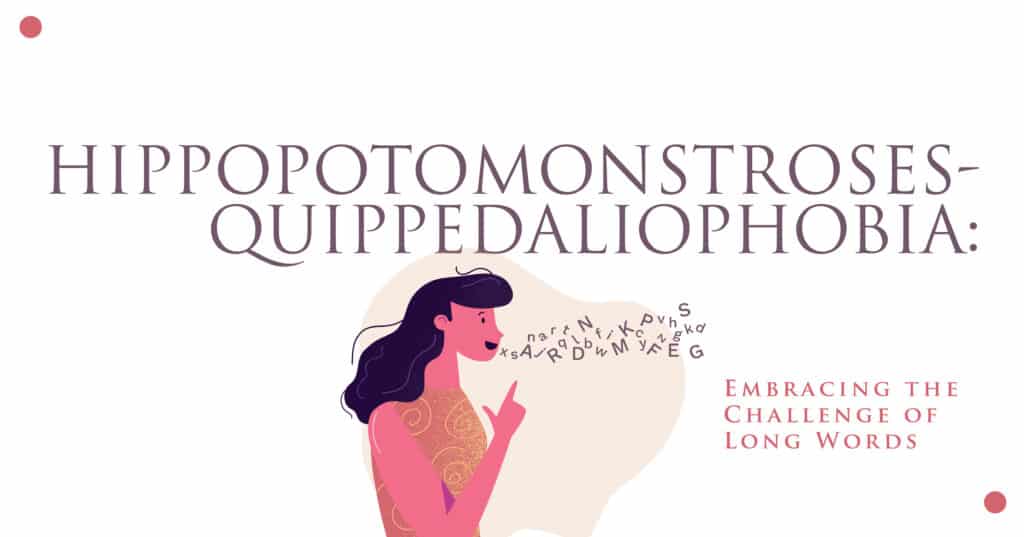Ironically, one of the longest words in the English language, hippopotomonstrosesquippedaliophobia, describes the fear of long words. This phobia, also known as sesquipedalophobia, can trigger significant anxiety and avoidance behaviors, impacting daily life.
For those in San Jose navigating this challenge, understanding and addressing this fear can open doors to improved mental health and communication. This blog explores the origins, symptoms, and coping strategies for hippopotomonstrosesquippedaliophobia, offering insights from psychology and linguistics to empower readers to embrace long words confidently.
What Is Hippopotomonstrosesquippedaliophobia?
Hippopotomonstrosesquippedaliophobia is a specific phobia characterized by an irrational fear of long or complex words. Though not officially recognized by the American Psychiatric Association, it’s often classified as a social phobia due to its impact on social and occupational functioning. Individuals may experience panic or embarrassment when encountering lengthy words, leading to avoidance of reading or speaking situations.
San Jose Mental Health
Origins and Meaning of the Term
The term hippopotomonstrosesquippedaliophobia is a blend of Greek and Latin roots, intentionally elongated for ironic effect. “Hippo” (Greek for horse) and “potamus” (river) evoke the hippopotamus, symbolizing something large. “Monstro” (Latin for monstrous) and “sesquipedalian” (Latin for measuring a foot and a half, meaning long words) amplify the term’s daunting nature. The suffix “-phobia” denotes fear. A shorter synonym, sesquipedalophobia, derives from “sesquipedalian” alone. The extended version, coined possibly by poet Aimee Nezhukumatathil around 2000, adds humor but can exacerbate anxiety for sufferers.
Common Symptoms and Effects
The fear of long words manifests through various symptoms, ranging from mild discomfort to severe anxiety. Common reactions include:
- Physical Symptoms: Rapid heartbeat, sweating, trembling, or nausea when seeing or pronouncing long words.
- Emotional Symptoms: Embarrassment, shame, or panic, especially in social settings like classrooms or meetings.
- Behavioral Symptoms: Avoiding reading, writing, or speaking situations involving complex vocabulary.

These symptoms can limit career choices, academic performance, and social interactions. For example, a student may struggle with textbooks, or an adult may avoid jobs requiring extensive documentation, leading to reduced self-esteem or depression.
Famous Examples of Long Words in the English Language
Long words often intimidate, but they’re integral to English. Here’s a table showcasing notable examples:
| Word | Length (Letters) | Meaning |
| Pneumonoultramicroscopicsilicovolcanoconiosis | 45 | A lung disease caused by silica dust inhalation |
| Antidisestablishmentarianism | 28 | Opposition to withdrawing state support from a church |
| Floccinaucinihilipilification | 29 | The act of deeming something worthless |
These words, though rare, highlight the richness of English vocabulary and the challenges they pose for those with hippopotomonstrosesquippedaliophobia.
How Long Words Are Used in Literature and Media
In literature, long words add depth or humor. Authors like Charles Dickens used terms like “floccinaucinihilipilification” to enrich prose, while modern media, such as The Simpsons, playfully references hippopotomonstrosesquippedaliophobia for comedic effect. However, such usage can inadvertently heighten anxiety for phobia sufferers, reinforcing avoidance behaviors.
Coping Mechanisms and Strategies
Managing hippopotomonstrosesquippedaliophobia involves practical strategies to reduce anxiety:
- Break Words Down: Divide long words into syllables (e.g., hip-po-poto-mon-stro-ses-quip-peda-lio-phobia) to make them manageable.
- Substitute Words: Use shorter synonyms (e.g., “fridge” instead of “refrigerator”) when possible.
- Practice Mindfulness: Deep breathing or meditation can calm physical symptoms during exposure.
- Gradual Exposure: Start with moderately long words and progress to complex ones to build confidence.
These techniques empower individuals to confront their fear incrementally, fostering resilience.
Therapeutic Approaches and Support
Professional treatment can significantly alleviate symptoms. Common approaches include:
- Cognitive Behavioral Therapy (CBT): Rewires negative thought patterns, helping individuals reframe long words as non-threatening. Learn more about CBT at PsychCentral.
- Exposure Therapy: Gradually introduces long words in a controlled setting to desensitize patients.
- Medication: Benzodiazepines like Ativan or Xanax may manage acute anxiety, though short-term use is recommended due to addiction risks.
- Support Groups: Connecting with others facing similar fears reduces isolation and encourages coping strategies.
A mental health professional can tailor these treatments to individual needs, ensuring effective management.
The Role of Long Words in Language and Communication
Long words enhance precision and expressiveness in language. In fields like medicine or law, terms like “pneumonoultramicroscopicsilicovolcanoconiosis” convey specific meanings efficiently. However, overuse can alienate audiences, particularly those with sesquipedalophobia, highlighting the need for balanced communication.
Why Long Words Matter
Long words matter because they enrich language, enabling nuanced expression. They challenge cognitive skills, fostering intellectual growth, but their complexity can exclude those with phobias, underscoring the importance of accessible communication.
San Jose Mental Health
Cultural and Linguistic Perspectives on Long Words
Different cultures approach long words uniquely. German, for instance, is known for compound words like “Rindfleischetikettierungsüberwachungsaufgabenübertragungsgesetz” (a 63-letter term for a beef labeling law). In contrast, English long words often stem from Greek or Latin, reflecting scholarly traditions. These perspectives reveal how language shapes perceptions of complexity and fear.
Personal Stories and Experiences
Personal accounts highlight the real impact of hippopotomonstrosesquippedaliophobia. A San Jose teacher shared how her fear led to avoiding academic texts, limiting her professional growth until CBT helped her confront long words. Another local, a student, described panic attacks during spelling bees but found relief through mindfulness and support groups, illustrating the power of community and therapy.
How Technology Shapes the Way We Communicate
Technology, from spell-checkers to voice assistants, simplifies interactions with long words. In San Jose, a hub for innovation, tech solutions like text-to-speech apps help phobia sufferers engage with complex vocabulary, reducing anxiety and enhancing communication.
Wordplay for Wellness With San Jose Mental Health
Navigating hippopotomonstrosesquippedaliophobia is a journey of courage and growth. At San Jose Mental Health, we’re committed to supporting you with tailored therapies and compassionate care. Whether you’re facing anxiety, phobias, or other mental health challenges, our team is here to help.
Contact San Jose Mental Health today to learn more or schedule a consultation to start embracing life’s challenges, one word at a time.

FAQs
What is sesquipedalophobia, and how does it relate to hippopotomonstrosesquippedaliophobia?
Sesquipedalophobia is a shorter term for the fear of long words, derived from “sesquipedalian” (meaning long words). It’s synonymous with hippopotomonstrosesquippedaliophobia, though the latter’s extended form adds irony. Both describe an anxiety disorder impacting communication and social interactions.
How can the fear of long words impact an individual’s mental health and daily life?
This phobia can lead to avoidance of reading or speaking, causing embarrassment, low self-esteem, and social isolation. It may limit career or academic opportunities, contributing to anxiety or depression. Professional support can mitigate these effects, improving quality of life.
What are the psychological factors that contribute to the development of hippopotomonstrosesquippedaliophobia?
Traumatic experiences, like being mocked for mispronouncing words, can trigger this phobia. Genetic predisposition to anxiety and learned behaviors from environment or family may also contribute. Changes in brain function, such as heightened fear responses, further increase risk.
Are there effective treatment options available for managing anxiety related to sesquipedalophobia?
Yes, treatments like cognitive behavioral therapy (CBT) and exposure therapy are highly effective in reducing anxiety. Medications like Ativan or Xanax may help manage symptoms short-term, but therapy offers lasting relief. Support groups and mindfulness practices also aid recovery.
San Jose Mental Health
How does linguistics play a role in understanding the fear of long words and its impact on communication?
Linguistics reveals how long words, often derived from Greek or Latin, can seem intimidating due to their structure. Understanding word formation demystifies them, reducing fear. This knowledge helps tailor communication to be inclusive, supporting those with the phobia.








